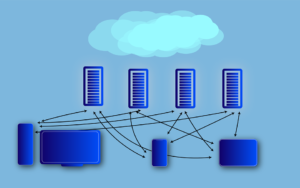Managed Service Provider: Enhancing Business – In today’s fast-paced business landscape, staying competitive means leveraging technology to its fullest potential. However, managing complex IT infrastructures and ensuring optimal performance can be challenging for many organizations. This is where Managed Service Providers (MSPs) come into play.
Managed Service Provider: Enhancing Business / Managed Service Provider: Enhancing Business
Introduction to Managed Service Providers (MSPs)

Managed Service Providers, or MSPs, are companies that remotely manage a customer’s IT infrastructure and/or end-user systems, typically on a proactive basis under a subscription model. Their primary goal is to ensure the functionality, performance, and security of their clients’ IT systems.
Services Offered by Managed Service Providers
MSPs offer a wide range of services, including IT infrastructure management, network security, data backup and recovery, cloud computing, and more. These services are designed to meet the specific needs of businesses of all sizes and industries.
Benefits of Using Managed Service Providers
One of the key benefits of partnering with an MSP is cost-effectiveness. Instead of hiring and maintaining an in-house IT team, businesses can outsource their IT needs to a specialized provider, reducing overhead costs. Additionally, MSPs provide proactive maintenance and support, helping to prevent costly downtime and disruptions.
Key Considerations When Choosing an MSP
When selecting an MSP, it’s essential to consider factors such as industry experience, service level agreements (SLAs), scalability, and pricing structure. It’s also crucial to ensure that the MSP’s offerings align with the specific needs and goals of your business.
Challenges Associated with Managed Service Providers
While MSPs offer many benefits, there are also some challenges to consider. These include integration with existing systems, data privacy and security concerns, and the potential reliance on third-party services. However, with proper planning and oversight, these challenges can be effectively managed.
Case Studies: Successful Implementation of MSP Services
Many businesses have experienced significant improvements in efficiency and security after partnering with MSPs. For example, Company A was able to enhance its network efficiency and security by outsourcing its IT needs to an MSP. Similarly, Company B achieved a seamless transition to cloud-based solutions with the help of an MSP.
Future Trends in Managed Service Provider Industry
Looking ahead, the MSP industry is poised for continued growth and innovation. Emerging trends such as artificial intelligence and automation, Internet of Things (IoT) integration, and enhanced cybersecurity measures are expected to shape the future of MSP services, providing even greater value to businesses.
Conclusion
In conclusion, Managed Service Providers play a vital role in helping businesses maximize the efficiency and security of their IT systems. By outsourcing their IT needs to specialized providers, businesses can reduce costs, improve performance, and focus on their core objectives. As technology continues to evolve, partnering with an MSP will become increasingly essential for staying competitive in today’s digital economy.
FAQs
- What industries can benefit from using managed service providers?
- Virtually any industry can benefit from using MSPs, including healthcare, finance, manufacturing, and retail, among others.
- How do managed service providers ensure data security?
- MSPs employ a range of security measures, including encryption, regular security audits, and compliance with industry regulations, to ensure the confidentiality and integrity of their clients’ data.
- Can small businesses afford managed service provider services?
- Yes, many MSPs offer scalable solutions tailored to the needs and budgets of small businesses, making their services accessible and affordable.
- What is the difference between MSPs and in-house IT departments?
- MSPs provide outsourced IT services on a subscription basis, whereas in-house IT departments are comprised of full-time employees dedicated to managing an organization’s IT infrastructure.
- Are there any risks associated with outsourcing IT services to MSPs?
- While outsourcing IT services to MSPs can offer many benefits, there are risks to consider, such as potential data breaches or service disruptions. However, these risks can be mitigated through careful vetting and ongoing monitoring of the MSP’s performance.




Pingback: Manchester United Merchandise: Celebrating the Red Devil Spirit - Realone
Pingback: Rihanna's Fashion Statement at Anant Ambani's Wedding - Realone